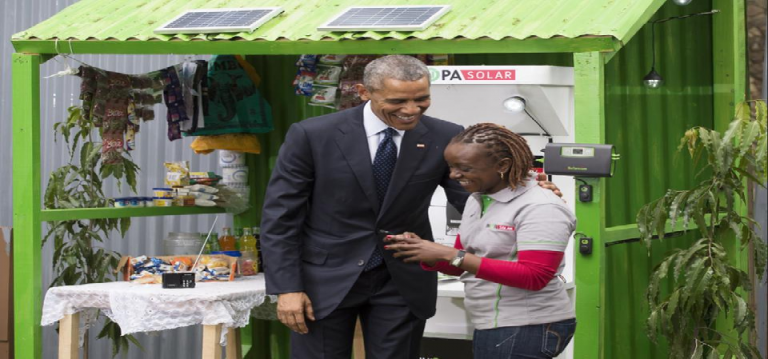
Finally, it is here: MTN Nigeria numbers can now dial the sun to provide electricity in homes. When I visited Kenya earlier in the year, I saw the team that pioneered what MTN and partners are bringing to Nigeria. Kenya’s M-KOPA has made it possible for families to use their mobile phone numbers to unlock solar power and pay for electricity. They give you some solar panel systems, you install in your house, and provided that you keep reloading your mobile phone number, with airtime credits, you will have electricity. It is the closest that you can get to pay-as-you-go model in electricity.
Using the pay-as-you-go model popularised by mobile phones, a remarkable Kenyan company, M-Kopa Solar, is providing rent-to-own solar energy products that will help provide cheap solar power to rural homes.
The M-Kopa IV Solar Home System includes a solar panel, control unit, three low-energy LED light bulbs (one of which is a portable, rechargeable torch) and a rechargeable radio. The control unit also has a USB port for charging cellphones. It’s a perfect off-the-grid solar system for Africa, where land-based infrastructure is poor and electricity supply is frequently erratic.
For a deposit of $35, buyers get the system then make 365 daily payments of $0.43 through mobile money system M-Pesa. When it is all paid off, the system belongs to the buyer outright.
Through Lumos, MTN Nigeria has brought this solution to Nigeria; it has sold its 60,000th unit. There could have been companies that started before Lumos/MTN, but you cannot discount the fact that MTN is behind this one. I expect it to be big, provided the acquisition cost is low. In short, if not for theft, the best penetration model could have been to make it pure energy-as-a-service where the initial acquisition cost is waived. That way, Lumos retains ownership of the solar systems, removing the burden to poor families who may be unable to afford the initial cost outlay.
But doing that will be irresponsible as people may not take good care of the equipments if they receive them free. A balance will be to make it rent-to-own where the customer can pay over time, and upon completing the payment term, takes ownership of the equipment. From Lumos press release sent to email:
Register for Tekedia Mini-MBA edition 19 (Feb 9 – May 2, 2026): big discounts for early bird.
Tekedia AI in Business Masterclass opens registrations.
Join Tekedia Capital Syndicate and co-invest in great global startups.
Register for Tekedia AI Lab: From Technical Design to Deployment (next edition begins Jan 24 2026).
This week, the Lumos Mobile Electricity Service deployed its 60,000th Y’ello Box, an at-home solar electricity device that lets users gain access to reliable electricity at an affordable price. The Lumos service is combining the power of the sun and your MTN mobile phone to bring a new type of power to Nigeria.
[…]
TMobile phones have transformed the way we spend our daily lives. In fact, a recent report declared Nigeria as the ‘world’s most mobilized country’ (http://apo.af/qD8dM5) with more mobile traffic than any other nation. With more and more mobiles, they not only drive our demand for more accessible and reliable power, but they can also help provide the solution.
Lumos Mobile Electricity Service operate in partnership with MTN. Once MTN customers have joined the service, they pay their monthly subscription fee for power from their MTN’s mobile phones air account by texting a simple code. There’s no need for mobile money, bank accounts or expensive machines. This is quick, easy, affordable, quiet and clean.
This is one of those elements that will help families. But it does not take away industrial and commercial needs for electricity. We still have to find ways to power the country, but incremental innovations like what Lumos and MTN are doing, if affordable, could offer choices to families in their homes.
The Agro-Park in Delta
While you rejoice with the MTN dialing the sun for homes in Nigeria, Delta State wants to go big on agriculture.
Overall the focus of the agro-industrial park development strategy is to bring about the accelerated structural transformation of the state’s economy through graduated industrialisation, leveraging the share of the industrial sector of GDP and the GDP share of the agricultural based manufacturing sub-sector.
In value terms, the development of agro-industries parks in Delta State creates the stimulants and opportunity to accelerate economic development and achieve its industrialisation goals. Primarily, the government’s state executive council agro-industrial park initiative remains a potent vehicle for the structural transformation of the Delta State economy. The initiative is also expected to help pave the way for the realisation of Nigeria’s Vision 2020 of becoming a leading manufacturing hub in Africa.
The agro-industrial park will also promote economic diversification and growth of the state, including creating more than 5,000 jobs along the agricultural value chain. It will also provide common dedicated infrastructure and facilities for agro-processing, value addition and agribusiness as a means to improving the ease-of-doing business.
According to the commissioner, the park will be executed through Public-Private Partnership involving the Delta State government, the Israel based Mirai Group and Norsworthy Investments Limited.
It will be very fascinating if Delta State goes ahead to execute this project. Agriculture in Nigeria needs to be industrialized and this initiative will help. Yet, government may soon understand that industrializing farming will require electricity and MTN phone numbers cannot support the energy capacity required.
---
Connect via my
LinkedIn |
Facebook |
X |
TikTok |
Instagram |
YouTube


